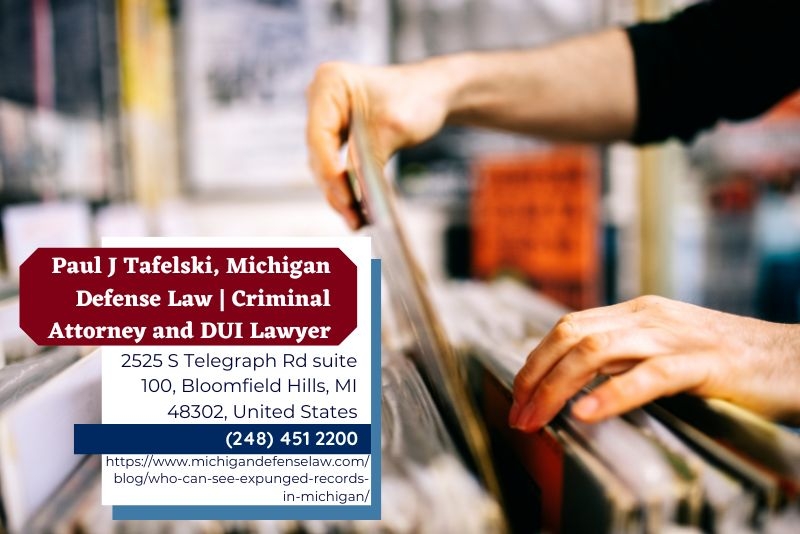Oakland County expungement attorney Paul J. Tafelski (https://www.michigandefenselaw.com/blog/who-can-see-expunged-records-in-michigan/) of Michigan Defense Law is providing critical insights into how expunged criminal records are handled under state law. Individuals in Michigan who have had convictions set aside often believe their past is completely erased. According to Paul J. Tafelski, understanding the visibility of expunged records is essential when navigating employment, housing, or licensing opportunities.
As a Oakland County expungement attorney based in Oakland County, Paul J. Tafelski explains that while expunged convictions are removed from public background checks, they are not entirely deleted. Law enforcement and certain government agencies retain limited access to sealed records. This can affect individuals who are undergoing criminal justice screenings, parole reviews, or professional licensing evaluations. Michigan expungement attorney Paul J. Tafelski regularly works with individuals throughout the state to help determine how expungement affects future legal and administrative processes.
Oakland County expungement attorney Paul J. Tafelski stresses that although a conviction may be set aside, nonpublic records remain accessible to the courts, prosecutors, and the Michigan State Police. These records are stored in the Michigan Law Enforcement Information Network (LEIN), which is used strictly for criminal justice purposes. The LEIN system allows agencies to view expunged information when making decisions related to new charges, plea agreements, or sentencing. The public, however, cannot access these records through standard background check platforms like ICHAT.
“Suppression means that the record will not appear on public records or the ICHAT system, but a permanent record is still retained on LEIN for judicial or law enforcement purposes,” said Paul J. Tafelski. The Michigan expungement attorney explains that the LEIN system ensures that courts and law enforcement have access to an individual’s complete criminal history when required for legal proceedings, supervision decisions, or eligibility assessments under state law.
While expungement offers relief by concealing records from general public view, there are exceptions. Government agencies responsible for licensing, probation supervision, and parole may access sealed records when permitted by law. Agencies that review applications for firearm permits, medical licenses, or law enforcement employment may also be able to see expunged offenses. According to Michigan expungement attorney Paul J. Tafelski, these exceptions are built into the Clean Slate laws to balance rehabilitation with public safety.
Michigan expungement attorney Paul J. Tafelski further notes that immigration screenings fall under federal jurisdiction, meaning expunged records in Michigan do not shield individuals from immigration consequences. U.S. Citizenship and Immigration Services (USCIS) may request certified records of expunged offenses when reviewing green card, visa, or naturalization applications. Federal immigration law does not treat expungements as erasing a conviction, and background checks conducted by USCIS include fingerprinting and database searches through the FBI.
Under Michigan law, eligibility for expungement varies. The Clean Slate Act allows for automatic expungement of certain convictions, including up to two felonies after 10 years and up to four misdemeanors after 7 years. However, crimes involving assault, dishonesty, vulnerable individuals, or serious harm are excluded. Michigan expungement attorney Paul J. Tafelski assists individuals in determining whether their criminal records meet the legal standards for expungement and helps file petitions when automatic relief is not available.
Even when expungement is granted, Paul J. Tafelski emphasizes the importance of understanding what reviewers can still access. When applying for jobs, licenses, or professional opportunities, it is often necessary to explain the circumstances of a past conviction and provide supporting documents. Michigan expungement attorney Paul J. Tafelski helps individuals prepare for those conversations by compiling certified records and guiding them through agency procedures.
The impact of a criminal record on daily life can be significant, even after years of rehabilitation. Background checks often prevent individuals from securing jobs or housing. Michigan expungement attorney Paul J. Tafelski believes that removing convictions from public view can offer individuals a chance to rebuild, but knowing the full scope of access to those records remains critical.
For those unsure of their eligibility or concerned about how sealed records might affect future applications, legal guidance can be essential. Michigan expungement attorney Paul J. Tafelski continues to provide legal direction to individuals seeking clarity and relief under Michigan’s evolving Clean Slate laws.
About Michigan Defense Law:
Michigan Defense Law is a criminal defense law firm serving clients throughout Michigan. Led by Michigan expungement attorney Paul J. Tafelski, the firm focuses on helping individuals clear eligible convictions, understand the legal effects of expungement, and protect their future in employment, licensing, and housing.
Embeds:
Youtube Video: https://www.youtube.com/watch?v=4iu-Re9LeEM
GMB: https://www.google.com/maps?cid=7441820969606749572
Email and website
Email: paul@michigandefenselaw.com
Website: https://www.michigandefenselaw.com/
Media Contact
Company Name: Michigan Defense Law
Contact Person: Paul J. Tafelski
Email: Send Email
Phone: (248) 451-2200
Address:2525 S Telegraph Rd suite 100
City: Bloomfield Hills
State: Michigan 48302
Country: United States
Website: https://www.michigandefenselaw.com/

